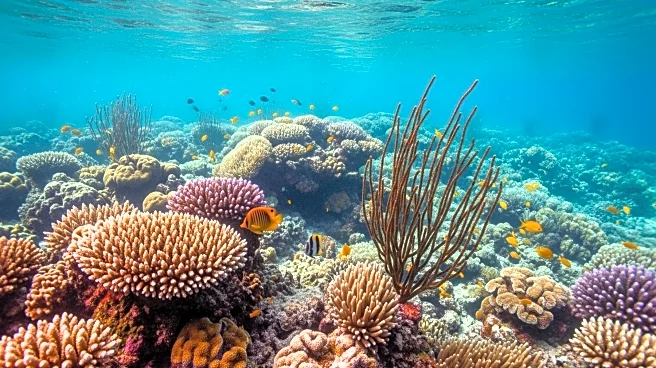What is the story about?
What's Happening?
Recent research led by Michael Kipp, Assistant Professor of Earth and Climate Sciences at Duke University, has uncovered significant connections between rising oxygen levels in deep-ocean environments and the evolution of marine life during the Late Devonian period. Published in the Proceedings of the National Academy of Sciences, the study highlights how oxygenation, driven by terrestrial plant growth, influenced the diversification of jawed vertebrates in deep-ocean habitats. The research utilized selenium isotope analysis of ancient sedimentary rocks to trace these oxygenation events, revealing a permanent increase in oxygen levels around 393-382 million years ago. This rise in oxygen coincided with the emergence of jawed fish, which became dominant in ocean ecosystems.
Why It's Important?
The findings underscore the critical role of oxygen in the evolution of marine life, particularly in the diversification of jawed vertebrates, which laid the foundation for vertebrates that dominate Earth's ecosystems today. The study also highlights the interconnectedness of terrestrial and marine environments, suggesting that the spread of woody plants on land contributed to increased atmospheric and oceanic oxygen levels. This research provides a cautionary tale for current oceanic conditions, as human-driven activities threaten to disrupt the delicate balance of oxygen in marine ecosystems, potentially reversing evolutionary progress made over millions of years.
What's Next?
The study warns of the modern threat of oxygen depletion in oceans, driven by nutrient pollution from fertilizers and industrial activities. These activities stimulate plankton blooms, which consume large amounts of oxygen when they decay, creating hypoxic zones where marine life struggles to survive. The research emphasizes the need for careful management of human activities to prevent catastrophic effects on marine ecosystems, similar to past drops in oxygen that affected ancient species.
Beyond the Headlines
The study highlights the ethical and environmental implications of human-driven oxygen depletion in oceans. It calls for increased awareness and action to preserve the balance of oxygen that has allowed marine species to flourish for millions of years. The research also points to the potential for long-term shifts in marine biodiversity if current trends continue, emphasizing the importance of sustainable practices to protect oceanic health.















